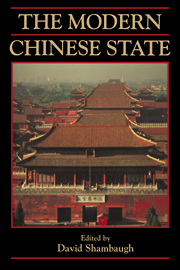Book contents
- Frontmatter
- Contents
- List of Contributors
- List of Illustrations
- List of Abbreviations
- Preface
- Introduction: The Evolving and Eclectic Modern Chinese State
- 1 The Late Imperial Chinese State
- 2 The Chinese State during the Republican Era
- 3 The Evolution of the State in the Republic of China on Taiwan
- 4 The Chinese State during the Maoist Era
- 5 The Chinese State in the Post-Mao Era
- 6 The Chinese Communist Economic State in Comparative Perspective
- 7 The Future of the Chinese State
- Index
4 - The Chinese State during the Maoist Era
Published online by Cambridge University Press: 15 October 2009
- Frontmatter
- Contents
- List of Contributors
- List of Illustrations
- List of Abbreviations
- Preface
- Introduction: The Evolving and Eclectic Modern Chinese State
- 1 The Late Imperial Chinese State
- 2 The Chinese State during the Republican Era
- 3 The Evolution of the State in the Republic of China on Taiwan
- 4 The Chinese State during the Maoist Era
- 5 The Chinese State in the Post-Mao Era
- 6 The Chinese Communist Economic State in Comparative Perspective
- 7 The Future of the Chinese State
- Index
Summary
When Mao did not personally intervene the system functioned more or less by standard procedures. The government dealt with issues, there were local discussions and feedback to the Center. But whenever Mao intervened this could no longer be sustained, the waters were muddied, and in 1958 there was no planning.
While the subject and focus of this essay is the Maoist state, it cannot be separated from the dynamics of Chinese Communist Party (CCP) elite politics. This is clearly reflected in the above statement by a leading ministerial official from the heavy industry sector in the midand late 1950s, someone who thus operated in both the heavily bureaucratic Soviet model period and under the personally driven policies of Mao Zedong during the Great Leap Forward. Simply put, the way in which the state functioned was fundamentally a result of the interactions of a small number of leaders – numbering no more than two dozen – at the apex of the system, with the input of Mao as unchallenged leader crucial whether in allowing other leaders to operate complex bureaucracies or taking the whole process by the scruff of the neck himself. This is by no means to say that Mao and his two dozen colleagues were the be-all and end-all of the Chinese state from 1949 to 1976, but it is to assert that his (and their) role was decisive.
A number of key issues arise about the Maoist state. One concerns the changing role of the many complex bureaucracies of the People's Republic of China (PRC), particularly the relationship of these institutions to the party leadership.
- Type
- Chapter
- Information
- The Modern Chinese State , pp. 105 - 160Publisher: Cambridge University PressPrint publication year: 2000
- 13
- Cited by



